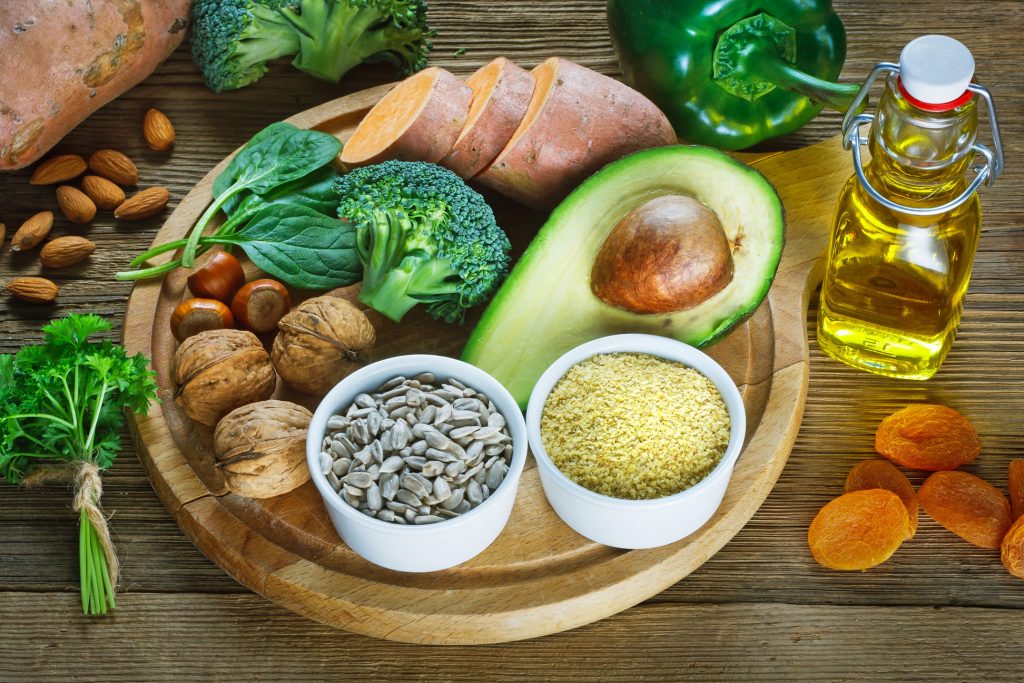Fat-soluble vitamins are a group of nutrients that support the maintenance of homeostasis and the proper functioning of the entire body. Their absorption is largely determined by the presence of fats in the food products we consume every day. What is the role of fat-soluble vitamins and why are they so important to us?
What vitamins dissolve in fats?
There are 4 fat-soluble vitamins: A, D, E and K. These are organic substances that do not dissolve in water, but only in fats and other organic solvents. These vitamins are not removed in excess with urine or sweat, so the body can store them (primarily in the liver and adipose tissue), and maintain their optimal level for a long time.
The absorption of vitamins A, D, E, K takes place via the fat present in food. For this reason, a balanced diet rich in healthy fats helps maintain the correct concentration of these substances in the body. Importantly, to maintain the correct level of these vitamins in the body, it is necessary to ensure the proper absorption of fats and the appropriate amount of them consumed with the daily diet.
What function do fat-soluble vitamins play in the body?
Each of the fat-soluble vitamins performs specific functions in the human body.
Vitamin A
Vitamin A is a group of chemical compounds belonging to carotenoids (retinol and its derivatives, beta-carotene). These substances take an active part in the proper vision and condition of the mucous membranes and skin. Additionally, vitamin A:
- supports the immune system;
- supports the healing process of wounds;
- regulates the proper growth of epithelial tissue;
- improves the regenerative capacity of cells;
- supports the skeletal system, protects against rickets and takes part in the construction of teeth;
- takes part in protein metabolism and spermatogenesis.
Vitamin D
Vitamin D, also referred to as the “sunshine vitamin”, is a substance that the body is able to produce on its own thanks to sunlight. Its most important functions in the body are:
- supporting the formation of the skeletal system;
- maintaining the correct concentration of calcium in the blood, which promotes better absorption of this ingredient in the intestines;
- inhibiting excessive excretion of calcium and phosphorus from the body;
- participating in efficient metabolism;
- beneficial effect on the nervous system and heart function;
- supporting healthy skin;
- supporting in increasing the number of sperm.
Vitamin E
Vitamin E, the so-called vitamin of youth, is a substance with strong antioxidant properties, which:
- participates in inhibiting the skin aging processes;
- nourishes, moisturizes and regenerates the skin;
- lowers the level of “bad” LDL cholesterol and increases the level of “good” (HDL),
- has a beneficial effect on the structure and permeability of cell membranes;
- supports the proper functioning of reproductive organs in women and men (including stimulating ovulation and regulating the function of the ovaries);
- has a beneficial effect on the nervous system;
- supports the proper development of the eyesight and nervous system of the fetus.
Vitamin K
Vitamin K is a substance synthesized by the bacterial flora of the digestive tract. It is stored primarily in the liver and is responsible for:
- the proper course of the synthesis process of prothrombin and coagulation factors;
- maintaining efficient calcium management in the body;
- synthesis of osteocalcin – a substance produced by bone-forming cells, responsible for bone formation.
Find out what vitamins and minerals are for people practicing sports.
Insufficient supply of fat-soluble vitamins – how to recognize?
A healthy, balanced diet means that we provide the body with the correct amount of ADEK vitamins. However, it happens that due to various dietary restrictions, our diet does not cover the body’s daily requirement for these vitamins. Then we can observe symptoms such as:
- vitamin A: brittle hair and nails, dry and irritated skin, deterioration of eyesight, lack of appetite, decreased immunity;
- vitamin D: bone and muscle weakness, reduced resistance to mechanical injuries, sleep problems, hair loss and, reduced appetite, fatigue, depression;
- vitamin E: concentration problems, weakened vision, fatigue and irritability, hair loss, decreased immunity;
- vitamin K: insufficient supply of vitamin K can primarily negatively affect the circulatory system, e.g. blood clotting.
Products rich in fat-soluble vitamins

Fat-soluble vitamins are found in various food products, especially those rich in healthy fats. Their natural sources include:
- vitamin A: liver, egg yolks, oily fish (e.g. salmon, tuna), milk and dairy products (e.g. butter and yellow cheese), fruit and vegetables (e.g. mango, apricots, pumpkin, carrots, red peppers);
- vitamin D: oily fish (e.g. herring, salmon, mackerel), liver, egg yolks, dairy products enriched with vitamin D (e.g. yoghurts, milk);
- vitamin E: oil seeds (e.g. linseed, sesame, sunflower), nuts (e.g. almonds, walnuts), oily fish (e.g. salmon, herring, tuna), avocado, vegetable oils (e.g. rapeseed oil, olive oil);
- vitamin K: green leafy vegetables (e.g. spinach, kale, lettuce), cabbage, broccoli, vegetable oils (e.g. rapeseed oil), fermented foods (e.g. sauerkraut and pickled cucumbers).
Check out how to take care of your immunity all year round.
How to take fat-soluble vitamins?
Products that are a source of fat-soluble vitamins should be consumed in combination with healthy fats. For example:
- pour a little olive oil over a carrot salad (source of vitamin A) and add sunflower seeds;
- make a sandwich with avocado paste (fat) and put tomato slices (source of vitamin K) and red pepper (rich in vitamin A) on it;
- compose a fruit and vegetable cocktail (e.g. spinach, banana, mango) and add a teaspoon of linseed oil or a little avocado (fat);
- prepare hummus with the addition of olive oil and combine it with vegetables cut into sticks, e.g. carrots (vitamin A) and parsley (vitamin K).
In a situation where a balanced diet is not enough to meet the body’s needs for fat-soluble vitamins, a specialist may recommend additional supplementation. However, it is important to precede its implementation with laboratory tests that will confirm the level of vitamins in the body. As part of supplementation, you can use multivitamin products, which usually do not need to be taken in the presence of fat.
Fat-soluble vitamins – summary
Fat-soluble vitamins, i.e. vitamins A, D, E and K, are responsible for the proper functioning of the entire body. Their task is, among others, to support the organ of vision, the immune system and bone health, as well as protect cells from damage. Their insufficient supply may cause various symptoms, which should be consulted with a specialist. After making an appropriate diagnosis, the doctor may recommend additional supplementation to supplement the diet. To increase the absorption of vitamins A, D, E, K by the body, they should be taken with healthy fats.
Bibliography:
Davis M., Vitamins and minerals in natural food, Vital 2023.
Gawęcki J., Berger S., Brzozowska A., Human nutrition, PWN Scientific Publishing House, 2011.
Jarosz M., Nutrition standards for the Polish population and their application, National Institute of Public Health-National Institute of Hygiene, 2020.
Pałasz M., Petzke E., Atlas of vitamins. Warsaw 2018, SBM Publishing House Sp. z o.o.
Moyad M., Przewodnik po świata suplementów, Łódź 2016, Galaktyka Publishing House Sp. z o.o.
